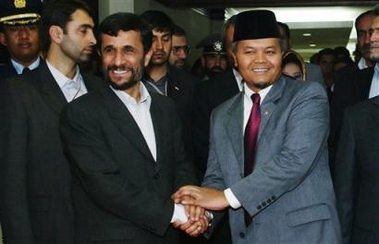Iran's president on Thursday accused Western powers of double standards in
their campaign against his country's nuclear program, and declared the threat of
sanctions doesn't worry him.

Iranian President
Mahmoud Ahmadinejad, left, meets with People's Consultative Assembly
chairman Hidayat Nurwahid, right, Wednesday, May 10, 2006 at the national
parliament in Jakarta, Indonesia. Ahmadinejad on Wednesday dismissed
Western concerns over nuclear proliferation as 'a big lie' and vowed to
keep pursuing nuclear technology, as Indonesia's leader offered to mediate
in the escalating international dispute.
[AP] |
Iranian President Mahmoud Ahmadinejad made his comments after key U.N.
Security Council members agreed to present Tehran with a choice of incentives or
sanctions in deciding whether to suspend uranium enrichment.
The Iranian leader told Metro TV station in an interview that he was
unconcerned about talk of sanctions and said he was ready to negotiate with any
country to resolve the dispute.
"If someone points an arm (a weapon) at your face and says you must speak,
will you do that?," he said.
He said that Western nations with large stocks of nuclear weapons were
practicing "double standards" in pressing Iran to stop its peaceful nuclear
program, and dismissed the threat of sanctions.
On Wednesday, in a letter to Time magazine published on its Web site, a
representative of Supreme Leader Ayatollah Ali Khamenei offered new options for
solving the impasse with the United States and its allies.
Hassan Rohani, Iran's former top nuclear negotiator, said Tehran would
consider ratifying an International Atomic Energy Agency protocol that provides
for intrusive and snap inspections and would also address the question of
preventing a pullout from the Nuclear Nonproliferation Treaty.
Sean McCormack, the State Department spokesman, says of the Time magazine
letter, "We've seen it. ... I think there really isn't anything new in it." He
said the letter does not deal at all with enrichment.
The current Iranian negotiator, Ali Larijani, said Tuesday that Tehran had no
intention of withdrawing from the treaty and promised to cooperate if the U.N.
atomic watchdog agency, rather than the Security Council, dealt with the issue
of its nuclear program.
Iran ended all voluntary cooperation with the IAEA in February, including
allowing snap inspections of its nuclear facilities.
Ahmadinejad told reporters Wednesday in Indonesia's capital that Iran will
"absolutely not back out" of defending its right to pursue new technology.
"They (Western powers) pretend that they are concerned about the nature of
the nuclear program of the Islamic republic of Iran," he said after meeting with
Indonesian President Susilo Bambang Yudhoyono. "This is a big lie."
"Today the people of Iran are not just defending their own rights, but also
those of other nations," he said. "They (the United States and other Western
powers) want to prevent other countries from reaching the pinnacle of science
and technology."
At a meeting Tuesday, representatives of the United States, Russia, China,
Britain and France as well as Germany agreed to tell Iran the possible
consequences of its refusal to halt its enrichment program and the benefits if
it abandons it.
The move will delay a U.S.-backed draft U.N. resolution that could lead to
sanctions and possible military action if Iran does not suspend uranium
enrichment.
U.S. Secretary of State Condoleezza Rice said Wednesday she and her
counterparts on the U.N. Security Council agreed to give Iran another two weeks
to reconsider its position.
"We agreed to continue to seek a Security Council resolution but that we
would wait for a couple of weeks while the Europeans design an offer to the
Iranians that would make clear they have a choice that would allow them to have
a civil nuclear program, if that is indeed what they want," Rice said on U.S. TV
network ABC's "Good Morning America."
The Chinese and Russians have balked at the British, French and U.S. efforts
to put the resolution under Chapter 7 of the U.N. Charter. Such a move would
declare Iran a threat to international peace and security and set the stage for
further measures if Tehran refuses to comply. Those measures could range from
breaking diplomatic relations to economic sanctions and military action.
Representatives from the three European countries that had been spearheading
negotiations with Iran ¡ª Britain, France and Germany ¡ª will now spend the next
few days preparing a package of incentives and sanctions, a European official
said, speaking on condition of anonymity because there has been no official
announcement.
The official said the package is likely to include issues related to energy
security and civilian nuclear power. The package will be presented to European
Union foreign ministers on the sidelines of an EU meeting in Brussels on Monday,
and if approved will be presented to the Iranian government, the official said.
The United States accuses Iran of seeking to develop nuclear weapons, a
charge Tehran denies, saying it aims only to generate energy.
Yudhoyono, speaking at a joint news conference after he met with Ahmadinejad
for about 90 minutes, said he believed Iran was willing to resolve the nuclear
standoff peacefully through further negotiations, and offered to help mediate.
Yudhoyono's spokesman, Dino Pati Djalal, said Iran was very receptive to the
offer.
"We need to breathe new life into the negotiations," he said.
Ahmadinejad was in Indonesia for a three-day state visit followed by a
development conference on the resort island of Bali.